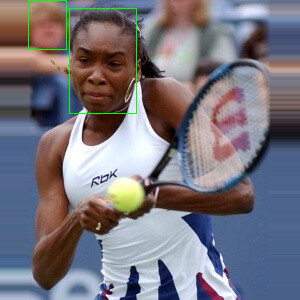Hello! New poster, so let me know if I need to change/add anything.
I am trying to create a simplified version of the yolov1 model for face detection.
I have created a custom Yolo module. The input is a n x 3 x 300 x 300 tensor of images and output is a n x 5 x 7 x 7 tensor of 49 regions and corresponding x, y, w, and h (only one predicted box per region for added simplicity).
class YOLO(nn.Module):
def __init__(self):
super(YOLO, self).__init__()
self.mp = nn.MaxPool2d(kernel_size=2, stride=2)
self.conv1 = nn.Conv2d(3, 64, kernel_size=3, padding=1)
self.conv2 = nn.Conv2d(64, 192, kernel_size=3, padding=1)
self.conv3 = nn.Conv2d(192, 256, kernel_size=3, padding=1)
self.conv4 = nn.Conv2d(256, 512, kernel_size=3, padding=1)
self.conv5 = nn.Conv2d(512, 1024, kernel_size=3, padding=1)
self.conv6 = nn.Conv2d(1024, 1024, kernel_size=3, padding=1)
self.conv7 = nn.Conv2d(1024, 1024, kernel_size=3, padding=1)
self.conv8 = nn.Conv2d(1024, 1024, kernel_size=3, padding=1)
self.conv9 = nn.Conv2d(1024, 1024, kernel_size=3, padding=1)
self.conv10 = nn.Conv2d(1024, 1024, kernel_size=3)
self.relu_downsize = nn.Sequential(
nn.MaxPool2d(kernel_size=2, stride=2),
nn.LeakyReLU(.01, inplace=False)
)
self.linear_layers = nn.Sequential(
nn.Flatten(),
nn.Linear(7 * 7 * 1024, 4096),
nn.LeakyReLU(.01, inplace=False),
nn.Linear(4096, 7 * 7 * 5),
nn.LeakyReLU(.01, inplace=False)
)
self.x_steps = torch.tile(torch.arange(start=0, end=7, step=1).view(1, 1, 7), (1, 7, 1))
self.y_steps = torch.tile(torch.arange(start=0, end=7, step=1).view(1, 7, 1), (1, 1, 7))
def forward(self, x):
x = self.relu_downsize(self.conv1(x))
x = self.relu_downsize(self.conv2(x))
x = self.relu_downsize(self.conv3(x))
x = F.leaky_relu(self.conv4(x), .01)
x = self.relu_downsize(self.conv5(x))
x = F.leaky_relu(self.conv6(x), .01)
x = self.relu_downsize(self.conv7(x))
x = F.leaky_relu(self.conv8(x))
x = F.leaky_relu(self.conv9(x))
x = F.leaky_relu(self.conv10(x))
x = torch.sigmoid(self.linear_layers(x))
x = x.view(-1, 5, 7, 7)
x[:, :2, :, :] = x[:, :2, :, :] / 7
x[:, 0, :, :] += torch.tile(self.x_steps.clone(), (x.shape[0], 1, 1))/7
x[:, 1, :, :] += torch.tile(self.y_steps.clone(), (x.shape[0], 1, 1))/7
return x
I have also created a YoloLoss module.
class YoloLoss(nn.Module):
def __init__(self):
super().__init__()
self.mse_loss = nn.MSELoss()
self.lambda_coord = .5
self.lambda_noobj = .5
def forward(self, yhat, y):
""" localization + classification YOLO loss
yhat is a (n x 5 x 7 x 7) tensor
y is a list of size n, each element being a (# faces x 4) tensor"""
num_images = len(y)
err_loc = 0
err_size = 0
err_inclass = 0
err_outclass = 0
for img_num, act_faces in enumerate(y):
responsible_regions = []
for face_num, act_face in enumerate(act_faces):
face_region = torch.floor(act_face[:2] * 7).type(torch.LongTensor).detach()
pred_loc = yhat[img_num, :2, face_region[0], face_region[1]]
pred_size = yhat[img_num, 2:4, face_region[0], face_region[1]]
pred_prob = yhat[img_num, 4, face_region[0], face_region[1]]
responsible_regions.append(face_region)
err_loc += self.mse_loss(pred_loc, act_face[:2])
err_size += self.mse_loss(torch.sqrt(pred_size), torch.sqrt(act_face[2:4]))
err_inclass += self.mse_loss(pred_prob, torch.ones_like(pred_prob))
err_outclass -= self.mse_loss(pred_prob, torch.zeros_like(pred_prob))
err_outclass += self.mse_loss(yhat[img_num, 4, :, :], torch.zeros_like(yhat[img_num, 4, :, :]))
return err_loc + err_size + err_inclass + err_outclass
When I run an example through the model, I get a good output tensor. When I compare that output to the actual with YoloLoss, I get a value that looks right. When I do loss.backward(), I then get this error:
/usr/local/lib/python3.7/dist-packages/torch/autograd/__init__.py:175: UserWarning: Error detected in MseLossBackward0. Traceback of forward call that caused the error:
File "/usr/lib/python3.7/runpy.py", line 193, in _run_module_as_main
"__main__", mod_spec)
File "/usr/lib/python3.7/runpy.py", line 85, in _run_code
exec(code, run_globals)
File "/usr/local/lib/python3.7/dist-packages/ipykernel_launcher.py", line 16, in <module>
app.launch_new_instance()
File "/usr/local/lib/python3.7/dist-packages/traitlets/config/application.py", line 846, in launch_instance
app.start()
File "/usr/local/lib/python3.7/dist-packages/ipykernel/kernelapp.py", line 499, in start
self.io_loop.start()
File "/usr/local/lib/python3.7/dist-packages/tornado/platform/asyncio.py", line 132, in start
self.asyncio_loop.run_forever()
File "/usr/lib/python3.7/asyncio/base_events.py", line 541, in run_forever
self._run_once()
File "/usr/lib/python3.7/asyncio/base_events.py", line 1786, in _run_once
handle._run()
File "/usr/lib/python3.7/asyncio/events.py", line 88, in _run
self._context.run(self._callback, *self._args)
File "/usr/local/lib/python3.7/dist-packages/tornado/platform/asyncio.py", line 122, in _handle_events
handler_func(fileobj, events)
File "/usr/local/lib/python3.7/dist-packages/tornado/stack_context.py", line 300, in null_wrapper
return fn(*args, **kwargs)
File "/usr/local/lib/python3.7/dist-packages/zmq/eventloop/zmqstream.py", line 452, in _handle_events
self._handle_recv()
File "/usr/local/lib/python3.7/dist-packages/zmq/eventloop/zmqstream.py", line 481, in _handle_recv
self._run_callback(callback, msg)
File "/usr/local/lib/python3.7/dist-packages/zmq/eventloop/zmqstream.py", line 431, in _run_callback
callback(*args, **kwargs)
File "/usr/local/lib/python3.7/dist-packages/tornado/stack_context.py", line 300, in null_wrapper
return fn(*args, **kwargs)
File "/usr/local/lib/python3.7/dist-packages/ipykernel/kernelbase.py", line 283, in dispatcher
return self.dispatch_shell(stream, msg)
File "/usr/local/lib/python3.7/dist-packages/ipykernel/kernelbase.py", line 233, in dispatch_shell
handler(stream, idents, msg)
File "/usr/local/lib/python3.7/dist-packages/ipykernel/kernelbase.py", line 399, in execute_request
user_expressions, allow_stdin)
File "/usr/local/lib/python3.7/dist-packages/ipykernel/ipkernel.py", line 208, in do_execute
res = shell.run_cell(code, store_history=store_history, silent=silent)
File "/usr/local/lib/python3.7/dist-packages/ipykernel/zmqshell.py", line 537, in run_cell
return super(ZMQInteractiveShell, self).run_cell(*args, **kwargs)
File "/usr/local/lib/python3.7/dist-packages/IPython/core/interactiveshell.py", line 2718, in run_cell
interactivity=interactivity, compiler=compiler, result=result)
File "/usr/local/lib/python3.7/dist-packages/IPython/core/interactiveshell.py", line 2822, in run_ast_nodes
if self.run_code(code, result):
File "/usr/local/lib/python3.7/dist-packages/IPython/core/interactiveshell.py", line 2882, in run_code
exec(code_obj, self.user_global_ns, self.user_ns)
File "<ipython-input-41-a13bfa0cb0de>", line 44, in <module>
loss = loss_func(preds, boxes_all)
File "/usr/local/lib/python3.7/dist-packages/torch/nn/modules/module.py", line 1110, in _call_impl
return forward_call(*input, **kwargs)
File "<ipython-input-41-a13bfa0cb0de>", line 34, in forward
err_size += self.mse_loss(torch.sqrt(pred_size), torch.sqrt(act_face[2:4]))
File "/usr/local/lib/python3.7/dist-packages/torch/nn/modules/module.py", line 1110, in _call_impl
return forward_call(*input, **kwargs)
File "/usr/local/lib/python3.7/dist-packages/torch/nn/modules/loss.py", line 529, in forward
return F.mse_loss(input, target, reduction=self.reduction)
File "/usr/local/lib/python3.7/dist-packages/torch/nn/functional.py", line 3262, in mse_loss
return torch._C._nn.mse_loss(expanded_input, expanded_target, _Reduction.get_enum(reduction))
(Triggered internally at ../torch/csrc/autograd/python_anomaly_mode.cpp:104.)
allow_unreachable=True, accumulate_grad=True) # Calls into the C++ engine to run the backward pass
---------------------------------------------------------------------------
RuntimeError Traceback (most recent call last)
<ipython-input-41-a13bfa0cb0de> in <module>()
43 loss_func = YoloLoss()
44 loss = loss_func(preds, boxes_all)
---> 45 loss.backward()
1 frames
/usr/local/lib/python3.7/dist-packages/torch/_tensor.py in backward(self, gradient, retain_graph, create_graph, inputs)
361 create_graph=create_graph,
362 inputs=inputs)
--> 363 torch.autograd.backward(self, gradient, retain_graph, create_graph, inputs=inputs)
364
365 def register_hook(self, hook):
/usr/local/lib/python3.7/dist-packages/torch/autograd/__init__.py in backward(tensors, grad_tensors, retain_graph, create_graph, grad_variables, inputs)
173 Variable._execution_engine.run_backward( # Calls into the C++ engine to run the backward pass
174 tensors, grad_tensors_, retain_graph, create_graph, inputs,
--> 175 allow_unreachable=True, accumulate_grad=True) # Calls into the C++ engine to run the backward pass
176
177 def grad(
RuntimeError: Found dtype Double but expected Float
I am not sure how to investigate the problematic tensor.
